WikiLeaks’ publication of “Cablegate” in late 2010 dwarfed previous releases in both size and impact and helped cause what one news outlet called a political meltdown for United States foreign policy.
Today we resume our series The Revelations of WikiLeaks with little more than a month before the extradition hearing for imprisoned WikiLeaks publisher Julian Assange begins. This is the sixth in a series that is looking back on the major works of the publication that has altered the world since its founding in 2006. The series is an effort to counter mainstream media coverage, which is ignoring WikiLeaks’ work, and is instead focusing on Julian Assange’s personality. It is WikiLeaks’ uncovering of governments’ crimes and corruption that set the U.S. after Assange, ultimately leading to his arrest on April 11 last year and indictment under the U.S. Espionage Act.
‘A Political Meltdown for US Foreign Policy’
By Elizabeth Vos
Special to Consortium News
 Of all WikiLeaks’ releases, probably the most globally significant have been the more than a quarter of a million U.S. State Department diplomatic cables leaked in 2010, the publication of which helped spark a revolt in Tunisia that spread into the so-called Arab Spring, revealed Saudi intentions towards Iran and exposed spying on the UN secretary general and other diplomats.
Of all WikiLeaks’ releases, probably the most globally significant have been the more than a quarter of a million U.S. State Department diplomatic cables leaked in 2010, the publication of which helped spark a revolt in Tunisia that spread into the so-called Arab Spring, revealed Saudi intentions towards Iran and exposed spying on the UN secretary general and other diplomats.
The releases were surrounded by a significant controversy (to be covered in a separate installment of this series) alleging that WikiLeaks purposely endangered U.S. informants by deliberately revealing their names. That allegation formed a major part of the U.S. indictment on May 23 of WikiLeaks publisher Julian Assange under the Espionage Act, though revealing informants’ names is not a crime, nor is there evidence that any of them were ever harmed.
WikiLeaks’ publication of “Cablegate,” beginning on Nov. 28, 2010, dwarfed previous WikiLeaks releases, in both size and impact. The publication amounted to 251,287 leaked American diplomatic cables that, at the time of publication, Der Spiegel described as“no less than a political meltdown for United States foreign policy.”
Cablegate revealed a previously unknown history of diplomatic relations between the United States and the rest of the world, and in doing so, exposed U.S. views of both allies and adversaries. As a result of such revelations, Cablegate’s release was widely condemned by the U.S. political class and especially by then-Secretary of State Hillary Clinton.
The Twitter handle Cable Drum, called it,
“… The largest set of confidential documents ever to be released into the public domain. The documents will give people around the world an unprecedented insight into U.S. Government foreign activities. The cables, which date from 1966 up until the end of February 2010, contain confidential communications between 274 embassies in countries throughout the world and the State Department in Washington DC. 15,652 of the cables are classified Secret.”
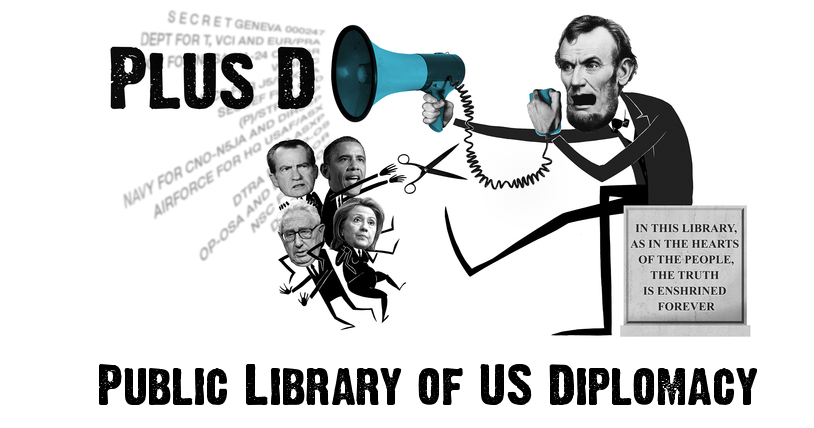 Among the historic documents that were grouped with Cablegate in WikiLeaks‘ Public Library of U.S. Diplomacy are 1.7 million that involve Henry Kissinger, national security adviser and secretary of state under President Richard Nixon; and 1.4 million related to the Jimmy Carter administration.
Among the historic documents that were grouped with Cablegate in WikiLeaks‘ Public Library of U.S. Diplomacy are 1.7 million that involve Henry Kissinger, national security adviser and secretary of state under President Richard Nixon; and 1.4 million related to the Jimmy Carter administration.
Der Spiegel reported that the majority were “composed by ambassadors, consuls or their staff. Most contain assessments of the political situation in the individual countries, interview protocols and background information about personnel decisions and events. In many cases, they also provide political and personal profiles of individual politicians and leaders.”
Cablegate rounded out WikiLeaks’ output in 2010, which had seen the explosive publication of previous leaks also from Army intelligence analyst Chelsea Manning including “Collateral Murder,” the “Afghan War Diaries” and “Iraq War Logs,” the subject of earlier installments in this series. As in the case of the two prior releases, WikiLeaks published Cablegate in partnerships with establishment media outlets.
The “Cablegate” archive was later integrated with the WikiLeaks Public Library of U.S. Diplomacy, which contains over 10 million documents.
Global U.S. Empire Revealed
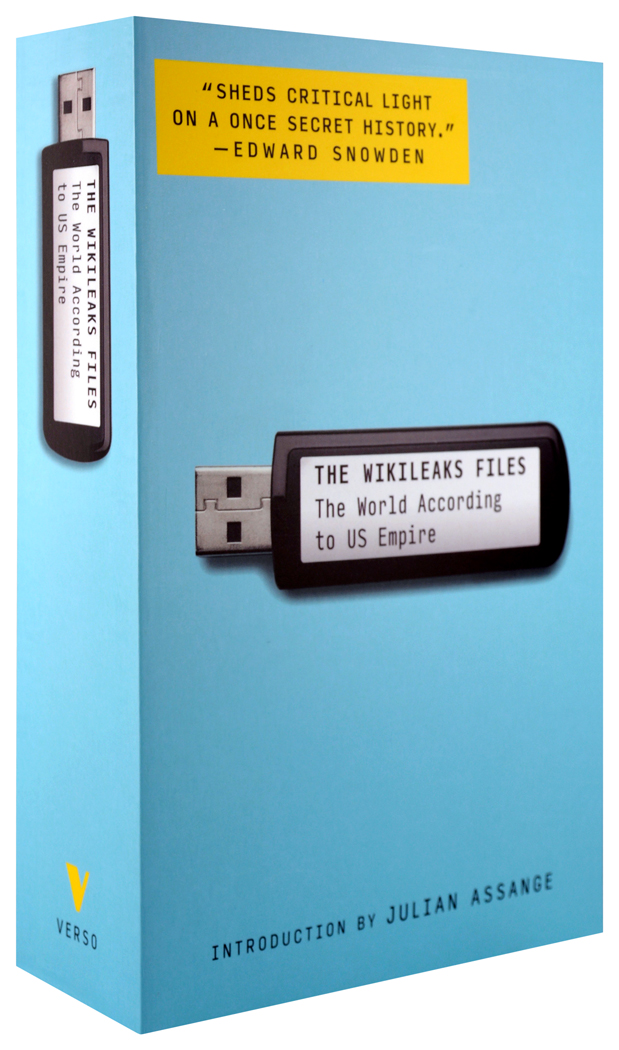 The impact of “Cablegate” is impossible to fully encapsulate, and should be the subject of historical study for decades to come. In September 2015 Verso published “The WikiLeaks Files: The World According to U.S. Empire,” with a foreword by Assange. It is a compendium of chapters written by various regional experts and historians giving a broader and more in-depth geopolitical analysis of U.S. foreign policy as revealed by the cables.
The impact of “Cablegate” is impossible to fully encapsulate, and should be the subject of historical study for decades to come. In September 2015 Verso published “The WikiLeaks Files: The World According to U.S. Empire,” with a foreword by Assange. It is a compendium of chapters written by various regional experts and historians giving a broader and more in-depth geopolitical analysis of U.S. foreign policy as revealed by the cables.
“The internal communications of the US Department of State are the logistical by-product of its activities: their publication is the vivisection of a living empire, showing what substance flowed from which state organ and when. Only by approaching this corpus holistically – over and above the documentation of each individual abuse, each localized atrocity – does the true human cost of empire heave into view,” Assange wrote in the foreword.
‘WikiLeaks Revolt’ in Tunisia
The release of “Cablegate” provided the spark that many argue heralded the Arab Spring, earning the late-November publication the moniker of the “WikiLeaks Winter.”
Eventually, many would also credit WikiLeaks’ publication of the diplomatic cables with initiating a chain-reaction that spread from the Middle East (specifically from Egypt) to the global Occupy Wall Street movement by late 2011.
The first of the Arab uprisings was Tunisia’s 28-day so-called Jasmine Revolution, stretching from Dec. 17, 2010, to Jan. 14, 2011, described as the “first WikiLeaks revolution.”
Cables published by WikiLeaksrevealed the extent of the Tunisian ruling family’s corruption, and were widely accessible in Tunisia thanks to the advent of social media platforms like Twitter. Then-President Zine El Abidine Ben Ali had been in power for over two decades at the time of the cables’ publication.
Please Donate to the Winter Fund Drive.
One State Department cable, labeled Secret, said:
“President Ben Ali’s extended family is often cited as the nexus of Tunisian corruption. Often referred to as a quasi-mafia, an oblique mention of ‘the Family’ is enough to indicate which family you mean. Seemingly half of the Tunisian business community can claim a Ben Ali connection through marriage, and many of these relations are reported to have made the most of their lineage.”
A June 2008 cable said: “Whether it’s cash, services, land, property, or yes, even your yacht, President [Zine el Abidine] Ben Ali’s family is rumored to covet it and reportedly gets what it wants.”

Symbolic middle finger gesture representing the Tunisian Revolution and its influences in the Arab world. From left to right, fingers are painted as flags of Libya, Egypt, Tunisia, Sudan and Algeria. (Khalid from Doha, CC BY 2.0, Wikimedia Commons)
The cables revealed that Ben Ali’s extended family controlled nearly the entire Tunisian economy, from banking to media to property development, while 30 percent of Tunisians were unemployed. They showed that state-owned property was expropriated to be passed on to private ownership by family members.
“Lax oversight makes the banking sector an excellent target of opportunity, with multiple stories of ‘First Family’ schemes,” one cable read. “”With real estate development booming and land prices on the rise, owning property or land in the right location can either be a windfall or a one-way ticket to expropriation,” said another.
The revolt was facilitated once the U.S. abandoned Ali. Counterpunch reported that: “The U.S. campaign of unwavering public support for President Ali led to a widespread belief among the Tunisian people that it would be very difficult to dislodge the autocratic regime from power. This view was shattered when leaked cables exposed the U.S. government’s private assessment: that the U.S. would not support the regime in the event of a popular uprising.”
The internet and large social media platforms played a crucial role in the spread of public awareness of the cables and their content amongst the Tunisian public. “Thousands of home-made videos of police repression and popular resistance have been posted on the web. The Tunisian people have used Facebook, Twitter and other social networking sites to organize and direct the mobilizations against the regime,” the World Socialist Website wrote.
Foreign Policy magazine reported:
“WikiLeaks acted as a catalyst: both a trigger and a tool for political outcry. Which is probably the best compliment one could give the whistle-blower site.” The magazine added: “The people of Tunisia shouldn’t have had to wait for Wikileaks to learn that the U.S. saw their country just as they did. It’s time that the gulf between what American diplomats know and what they say got smaller.”
The Guardian published an account in January 2011 by a young Tunisian, Sami Ben Hassine, who wrote: “The internet is blocked, and censored pages are referred to as pages “not found” – as if they had never existed. And then, WikiLeaks reveals what everyone was whispering. And then, a young man [Mohamed Bouazizi] immolates himself. And then, 20 Tunisians are killed in one day. And for the first time, we see the opportunity to rebel, to take revenge on the ‘royal’ family who has taken everything, to overturn the established order that has accompanied our youth.”
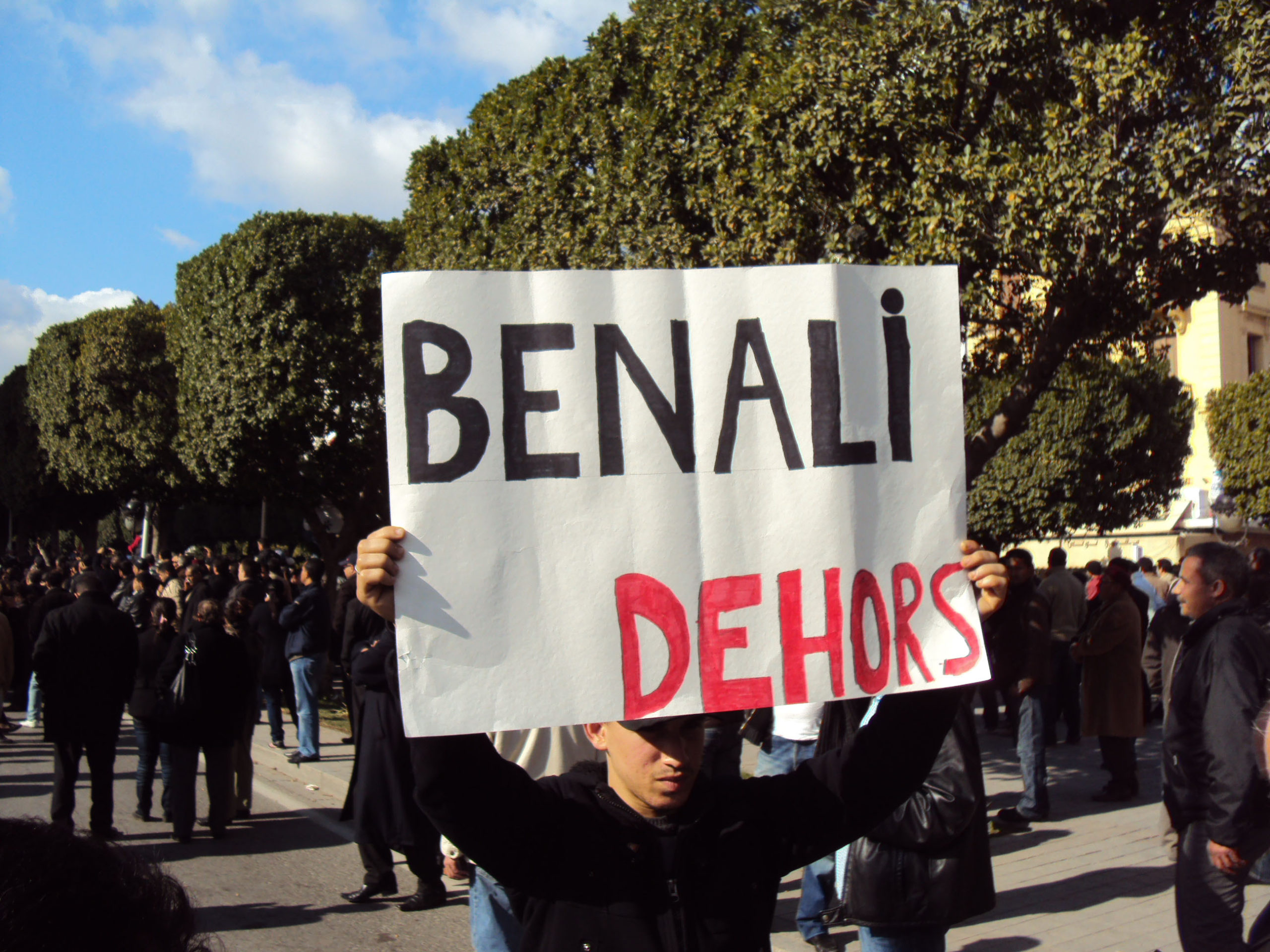
Protester in Tunis, Jan. 14, 2011, holding sign. Translation from French: “Ben Ali out.” (Skotch 79, CC0, Wikimedia Commons)
On the first day of Chelsea Manning’s pretrial in December 2011, Daniel Ellsberg told Democracy Now:
“The combination of the WikiLeaksand Bradley Manning exposures in Tunis and the exemplification of that by Mohamed Bouazizi led to the protests, the nonviolent protests, that drove Ben Ali out of power, our ally there who we supported up ’til that moment, and in turn sparked the uprising in Egypt, in Tahrir Square occupation, which immediately stimulated the Occupy Wall Street and the other occupations in the Middle East and elsewhere. … I hope [Manning and Assange] will have the effect in liberating us from the lawlessness that we have seen and the corruption — the corruption — that we have seen in this country in the last 10 years and more, which has been no less than that of Tunis and Egypt.”
Clinton Told US Diplomats to Spy at UN
The cables’ revelation that the U.S. State Department under then-Secretary-of-State Clinton had demanded officials act as spies on officials at the United Nations — including the Secretary General — was particularly embarrassing for the United States.
El Pais summarized the bombshell: “The State Department sent officials of 38 embassies and diplomatic missions a detailed account of the personal and other information they must obtain about the United Nations, including its secretary general, and especially about officials and representatives linked to Sudan, Afghanistan, Somalia, Iran and North Korea.
El Pais continued: “Several dispatches, signed ‘Clinton’ and probably made by the office of Secretary of State, Hillary Clinton, contain precise instructions about the myriad of inquiries to be developed in conflict zones, in the world of deserters and asylum seekers, in the engine room of the Israeli-Palestinian conflict, or about the United Kingdom, France, Germany, Russia and China to know their plans regarding the nuclear threat in Tehran.”
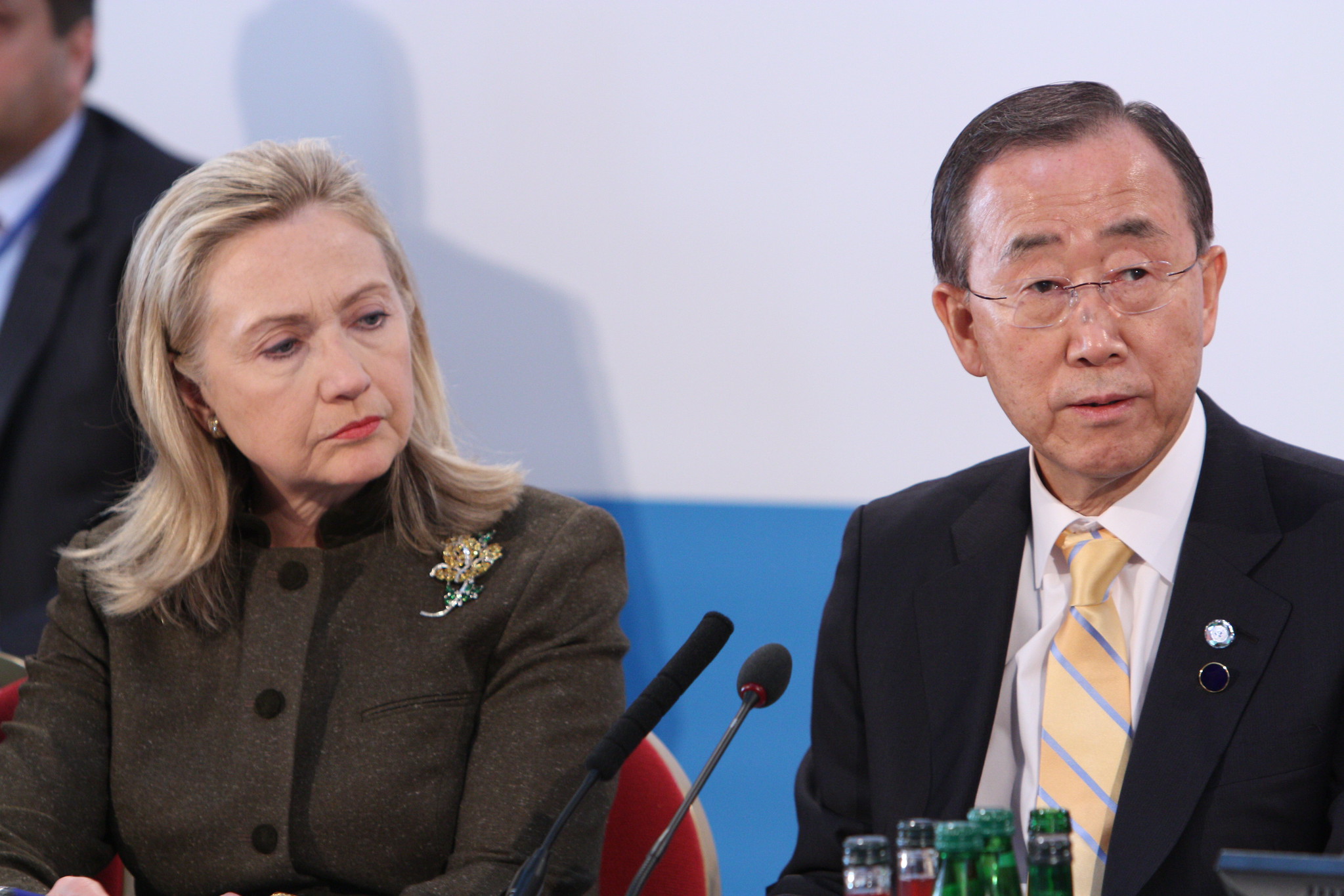
Secretary of State Hillary Rodham Clinton & UN Secretary General Ban Ki-Moon in 2012. (Foreign and Commonwealth Office/Flickr)
CNN described the information diplomats were ordered to gather: “In the July 2009 document, Clinton directs her envoys at the United Nations and embassies around the world to collect information ranging from basic biographical data on foreign diplomats to their frequent flyer and credit card numbers and even ‘biometric information on ranking North Korean diplomats.’ Typical biometric information can include fingerprints, signatures and iris recognition data.”
Der Spiegel reported that Clinton justified the espionage orders by emphasizing that “a large share of the information that the US intelligence agencies works with comes from the reports put together by State Department staff around the world.”
Der Spiegel added: “The US State Department also wanted to obtain information on the plans and intentions of UN Secretary General Ban Ki-moon and his secretariat relating to issues like Iran, according to the detailed wish list in the directive. The instructions were sent to 30 US embassies around the world, including the one in Berlin.”
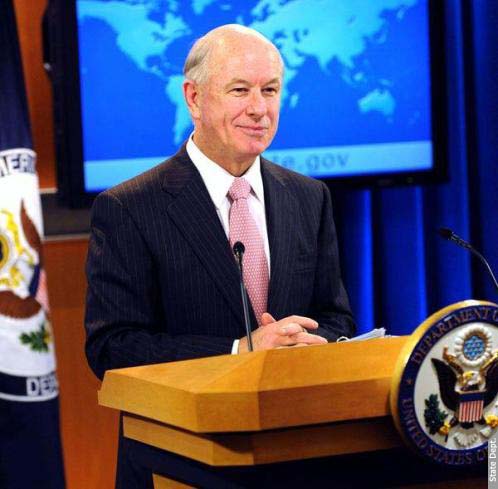
Philip J. Crowley as assistant secretary of state for public affairs in 2010. (State Department)
The State Department responded to the revelations, with then- State-Department-spokesman P.J. Crowley reportedly disputing that American diplomats had assumed a new role overseas.
“Our diplomats are just that, diplomats,” he said. “They represent our country around the world and engage openly and transparently with representatives of foreign governments and civil society. Through this process, they collect information that shapes our policies and actions. This is what diplomats, from our country and other countries, have done for hundreds of years.”
In December 2010, just after the cables’ publication, Assange told Time: “She should resign if it can be shown that she was responsible for ordering U.S. diplomatic figures to engage in espionage in the United Nations, in violation of the international covenants to which the U.S. has signed up.”
Saudis & Iran
A diplomatic cable dated April 20, 2008, made clear Saudi Arabia’s pressure on the United States to take action against its enemy Iran, including not ruling out military action against Teheran:
“[Then Saudi ambassador to the US Abbdel] Al-Jubeir recalled the King’s frequent exhortations to the US to attack Iran and so put an end to its nuclear weapons program. ‘He told you to cut off the head of the snake,’ he recalled to the Charge’, adding that working with the US to roll back Iranian influence in Iraq is a strategic priority for the King and his government. 11. (S) The Foreign Minister, on the other hand, called instead for much more severe US and international sanctions on Iran, including a travel ban and further restrictions on bank lending. Prince Muqrin echoed these views, emphasizing that some sanctions could be implemented without UN approval. The Foreign Minister also stated that the use of military pressure against Iran should not be ruled out.”
Dyncorp & the ‘Dancing Boys’ of Afghanistan
The cables indicate that Afghan authorities asked the United States government to quash U.S. reporting on a scandal stemming from the actions of Dyncorp employees in Afghanistan in 2009.
Employees of Dyncorp, a paramilitary group with an infamous track-record of alleged involvement in sex trafficking and other human rights abuses in multiple countries, were revealed by Cablegate to have been involved with illegal drug use and hiring the services of a “bacha bazi,” or underage dancing boy.
A 2009 cable published by WikiLeaks described an event where Dyncorp had purchased the service of a “bacha bazi.” The writer of the cable does not specify what happened during the event, describing it only as “purchasing a service from a child,” and he tries to convince a journalist not to cover the story in order to not “risk lives.”
Although Dyncorp was no stranger to controversy by the time of the cables’ publication, the revelation of the mercenary force’s continued involvement in bacha bazi provoked further questions as to why the company continued to receive tax-payer funded contracts from the United States.
Sexual abuse allegations were not the only issue haunting Dyncorp. The State Department admitted in 2017 that it “could not account for” more than $1 billion paid to the company, as reported by Foreign Policy.
The New York Times later reported that U.S. soldiers had been told to turn a blind eye to the abuse of minors by those in positions of power: “Soldiers and Marines have been increasingly troubled that instead of weeding out pedophiles, the American military was arming them in some cases and placing them as the commanders of villages — and doing little when they began abusing children.”
Australia Lied About Troop Withdrawal
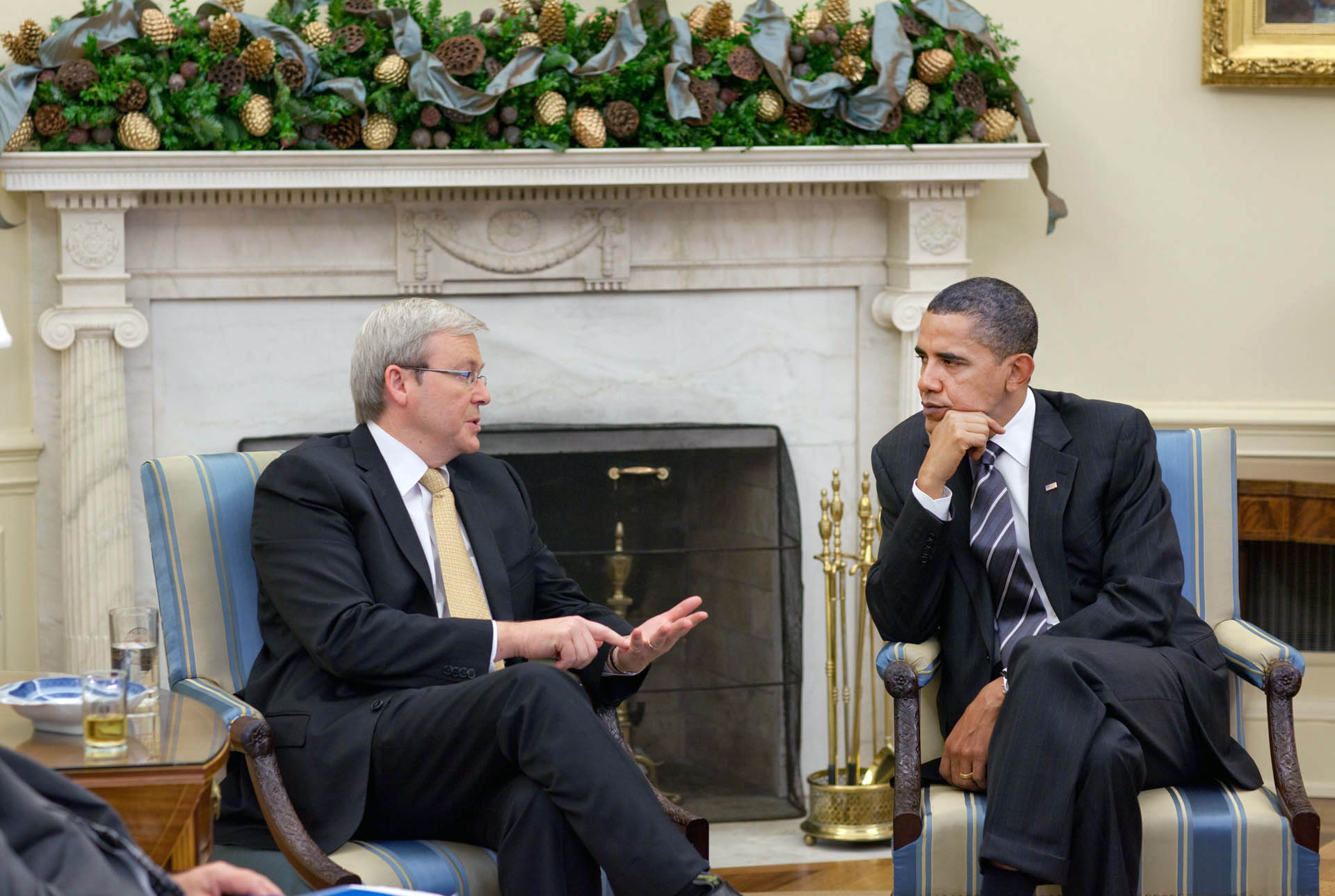
Prime Minister Kevin Rudd of Australia, left, with U.S. President Barack Obama, in the Oval Office, Nov. 30, 2009, to discuss a range of issues including Afghanistan and climate change. (White House/Pete Souza)
The Green Left related that the cables exposed Australian Prime Minister Kevin Rudd’s double talk about withdrawing troops. “Despite government spin about withdrawing all ‘combat forces,’ the cables said some of these forces could be deployed in combat roles. One cable said, “[d]espite the withdrawal of combat forces, Rudd agreed to allow Australian forces embedded or seconded to units of other countries including the U.S. to deploy to Iraq in combat and combat support roles with those units.”
US Meddling in Latin America
Cables revealed that U.S. ambassadors to Ecuador had opposed the presidential candidacy of Raphael Correa despite their pretense of neutrality, as observed by The Green Left Weekly.
Additional cables revealed the Vatican attempted to increase its influence in Latin America with the aid of the U.S. Further cables illustrated the history of Pope Francis while he was a cardinal in Argentina, with the U.S. appearing to have a positive outlook on the future pontiff.
Illegal Dealings Between US & Sweden
WikiLeaksfounder Julian Assange wrote in his affidavit:
“Through the diplomatic cables I also learned of secret, informal arrangements between Sweden and the United States. The cables revealed that Swedish intelligence services have a pattern of lawless conduct where US interests are concerned. The US diplomatic cables revealed that the Swedish Justice Department had deliberately hidden particular intelligence information exchanges with the United States from the Parliament of Sweden because the exchanges were likely unlawful.”
Military Reaction
On Nov. 30, 2010, the State Department declared it would remove the diplomatic cables from its secure network in order to prevent additional leaks. Antiwar.com added: “The cables had previously been accessible through SIPRNet, an ostensibly secure network which is accessible by millions of officials and soldiers. It is presumably through this network that the cables were obtained and leaked to WikiLeaks.”
The Guardian described SIPRNet as a “worldwide US military internet system, kept separate from the ordinary civilian internet and run by the Defence Department in Washington.”
Political Fury
On Nov. 29, 2010, then Secretary of State Hillary Clinton said of the “Cablegate” release:
“This disclosure is not just an attack on America’s foreign policy; it is an attack on the international community, the alliances and partnerships, the conventions and negotiations that safeguard global security and advance economic prosperity.”
The next day, former Arkansas Gov. Mike Huckabee called for Chelsea Manning’s execution, according to Politico.
Some political figures did express support for Assange, including U.K. Labor leader Jeremy Corbyn, who wrote via Twitter days after Cablegate was published: “USA and others don’t like any scrutiny via wikileaks and they are leaning on everybody to pillory Assange. What happened to free speech?”
Other notable revelations from the diplomatic cables included multiple instances of U.S. meddling in Latin America, the demand by then-Secretary of State Hillary Clinton that diplomatic staff act as spies, the documentation of misconduct by U.S. paramilitary forces, the fallout of the 2008 financial crisis in Iceland, the deployment of U.S. nuclear weapons in Germany and other European countries, that the Vatican attempted to increase its influence in Latin America with the aid of the U.S. , that U.S. diplomats had essentially spied on German Chancellor Angele Merkel, and much more.
Der Spiegel reported on Hillary Clinton’s demand that U.S. diplomats act as spies:
“As justification for the espionage orders, Clinton emphasized that a large share of the information that the U.S. intelligence agencies works with comes from the reports put together by State Department staff around the world. The information to be collected included personal credit card information, frequent flyer customer numbers, as well as e-mail and telephone accounts. In many cases the State Department also requested ‘biometric information,’ ‘passwords’ and ‘personal encryption keys.’ ”
Der Spiegel added: “The U.S. State Department also wanted to obtain information on the plans and intentions of UN Secretary General Ban Ki-moon and his secretariat relating to issues like Iran, according to the detailed wish list in the directive. The instructions were sent to 30 U.S. embassies around the world, including the one in Berlin.”
Elizabeth Vos is a freelance reporter and co-host of CN Live.
CORRECTION: CableDrum is an independent Twitter feed and is not associated with WikiLeaks as was incorrectly reported here.
Please Donate to the Winter Fund Drive.
Before commenting please read Robert Parry’s Comment Policy. Allegations unsupported by facts, gross or misleading factual errors and ad hominem attacks, and abusive or rude language toward other commenters or our writers will not be published. If your comment does not immediately appear, please be patient as it is manually reviewed. For security reasons, please refrain from inserting links in your comments, which should not be longer than 300 words.

Nils Melzer (Jan 7, 2020):
> Thanks to @EFJEUROPE & @IFJGlobal for their timely alert to @CoEMediaFreedom on the continued arbitrary imprisonment & #torture of #Assange by #UK & for formally categorising this case as a “Level 1” (i.e. most severe) threat to media freedom in Europe & worldwide!
> @coe @CoE_CPT
Council of Europe Alert:
Continued Detention of WikiLeaks Founder and Publisher Julian Assange — Council of Europe: Threats to media freedom — Level 1 — United Kingdom — n° 1/2020 — Alert created on: 07 Jan 2020
For the sake of everyone let this man out so he can tell all.
Free Julian, and let him live.
#freejulianassange #no_usa_extradition #freepress
The US has a lotta damn gall, nist?
Double and triple standards and more. Not that anyone should be so foolish as to think this will change American behavior.
A truly great series, thank you.
The Revelations of WikiLeaks — Consortium News Series
1. The Video that Put Assange in US Crosshairs — April 23, 2019
2. The Leak That ‘Exposed the True Afghan War’ — May 9, 2019
3. The Most Extensive Classified Leak in History — May 16, 2019
4. The Haunting Case of a Belgian Child Killer and How WikiLeaks Helped Crack It — July 11, 2019
5. Busting the Myth WikiLeaks Never Published Damaging Material on Russia — September 23, 2019
6. US Diplomatic Cables Spark ‘Arab Spring,’ Expose Spying at UN & Elsewhere — January 14, 2020
For an updated list with links to the articles, a Google search is:
“The Revelations of WikiLeaks” site:consortiumnews.com
– – –
Consortium News wrote:
> Today we resume our series The Revelations of WikiLeaks with little more than a month before the extradition hearing for imprisoned WikiLeaks publisher Julian Assange begins.
Yes and, shockingly, Julian has been allowed only 2 hours with his lawyers in the last month, crucial to prepare the extradition hearings. See:
Summary from Assange hearing at Westminster Magistrates Court this morning — Tareq Haddad — Thread Reader — Jan 13th 2020
Free Assange !
Great effort in the field of journalism. keep it up!